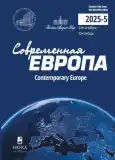EU and US in the Middle East: “Soft Power” Failure
- 作者: SHUMILINA I.V.1
-
隶属关系:
- Georgy Arbatov Institute for U.S. and Canada Studies, Russian Academy of Sciences (ISKRAN)
- 期: 编号 5 (133) (2025)
- 页面: 120-130
- 栏目: SECURITY ISSUES
- URL: https://rjsvd.com/0201-7083/article/view/695691
- DOI: https://doi.org/10.31857/S0201708325050109
- ID: 695691
如何引用文章
详细
The article examines the situation, in which the United States and the European Union found themselves in the institutionalized systems of development assistance to third countries after D. Trump suspended the work of USAID (organization was closed and banned in Russia). The significance of this topic is related to the fact that the provision of aid (humanitarian and economic) to those in need abroad has long been not only a significant component of Western foreign policy (in particular, a manifestation of its “soft power”), but also one of the tools for maintaining the “global liberal order” in the world. It is indicative that with all the criticism of this instrument for 64 years in the United States itself, both Democrats and Republicans have so far considered it important to continue its work. In the European Union, this aspect of foreign policy (EuroAID) not only retains its importance today, even despite the hesitation of individual national governments, but also (after Trump's decision on USAID) receives new impulses to intensify and expand the geography of its application. In the EU, the question is increasingly being raised to what extent Europeans could “compensate” for the Americans' withdrawal from humanitarian aid in the Third World, particularly in the Middle East region adjacent to Europe, with their potential. The author considers such a prospect taking into account certain differences between the respective American and European concepts.
作者简介
Inna SHUMILINA
Georgy Arbatov Institute for U.S. and Canada Studies, Russian Academy of Sciences (ISKRAN)
Email: i.shumilina@iskran.ru
ORCID iD: 0000-0003-4796-554X
Candidate of Sciences (Politics), Senior researcher Department of Domestic Political Studies Moscow, Russia
参考
- Бартенев В.И. (2020) Европейские доноры в арабском мире: перераспределение ресурсов и ролей. Современная Европа. № 6. С. 76–89. DOI: http://dx.doi.org/10.15211/soveurope620207689
- Кубышкин А.И., Цветкова Н.А. (2013) Публичная дипломатия США. Аспект пресс, Москва. 271 с.
- Потемкина О.Ю. (2016) Миграционный кризис и политика Европейского союза. Актуальные проблемы Европы. № 4. C. 38‒60.
- Шумилин А.И. (2024) Ближневосточная политика Евросоюза: в поисках эффективной стратегии. Научно-аналитический вестник ИЕ РАН. № 2. С. 7–14. doi: 10.15211/vestnikieran22024714
- Ahlberg K.L. (2009) Transplanting the Great Society: Lyndon Johnson and Food for Peace. University of Missouri Press, Columbia, USA. 296 p.
- Bodenstein T., Furness M. (2023) European Aid to the MENA region after the arab uprisings: A window of opportunity missed. WIDER Working Paper. No. 2023/48. 20 p. DOI: https://doi.org/10.35188/UNU-WIDER/2023/356-7.
- EPRS (2018) EU external financing instruments and the post-2020 architecture. European implementation assessment. European Parliamentary Research Service, Brussels, Belgium. 106 p. doi: 10.2861/141
- Gillespie R., Youngs R. (2002) The European Union and Democracy Promotion: The Case of North Africa (Democratization Studies). Routledge, London, UK. 220 p.
- Hoeffler A., Outram V. (2011) Need, Merit, or Self-Interest – what Determines the Allocation of Aid? Review of Development Economics. Vol. 15(2). P. 237‒250. doi: 10.1111/j.14679361.2011.00605.x
- Holm M. (2017) The Marshall Plan. A New Deal for Europe. Routledge, N.Y., USA. 234 p. doi: 10.4324/9781315690087
- Primorac M. (2023) Agency for International Development. Mandate for Leadership. The Conservative Promise. Project 2025. Presidential Transition Project. Ed. by P. Dans, S. Groves. The Heritage Foundation, Washington, USA. P. 253–281.
- Thiel M. (2004) The conditionality of U.S. & E.U. development aid upon democratization. A comparison. E-working Papers, Centros de Estudios Europeos. Vol. 2(1). 22 p.
- Youngs R., Zinhnioğlu Ö. (2021) EU aid policy in the Middle East and North Africa: Politicization and its Limits. Journal of Common Market Studies. Vol. 59 (1). P. 126–142. doi: 10.1111/jcms.13136
补充文件









